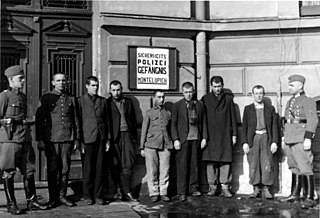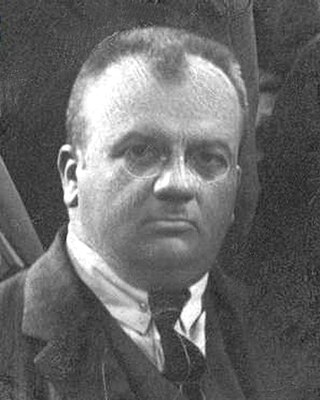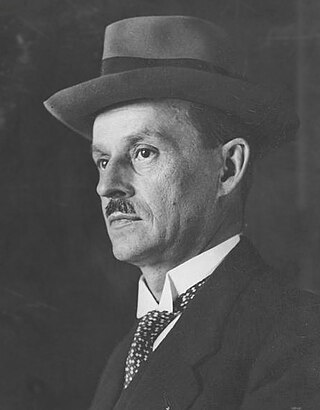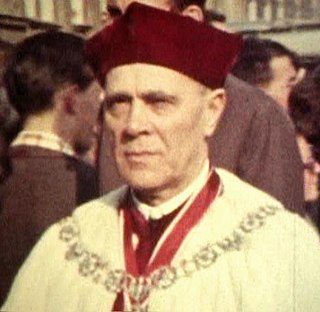
The Jagiellonian University is a public research university in Kraków, Poland. Founded in 1364 by King Casimir III the Great, it is the oldest university in Poland and the 13th oldest university in continuous operation in the world. It is regarded as Poland's most prestigious academic institution. The university has been viewed as a vanguard of Polish culture as well as a significant contributor to the intellectual heritage of Europe.

Sonderaktion Krakau was a German operation against professors and academics of the Jagiellonian University and other universities in German-occupied Kraków, Poland, at the beginning of World War II. It was carried out as part of the much broader action plan, the Intelligenzaktion, to eradicate the Polish intellectual elite, especially in those centers that were intended by the Germans to become culturally German.
Kazimierz Piwarski was a Polish historian, professor of Jagiellonian University in Kraków since 1946 and Poznań University in years 1953-1955, member of Polish Academy of Skills since 1945, and member of Polish Academy of Sciences since 1958.

The AB-Aktion, was a second stage of the Nazi German campaign of violence during World War II aimed to eliminate the intellectuals and the upper classes of the Second Polish Republic across the territories slated for eventual annexation. Most of the killings were arranged in a form of forced disappearances from multiple cities and towns upon the German arrival. In the spring and summer of 1940, more than 30,000 Polish citizens were arrested by the Nazi authorities in German-occupied central Poland, the so-called General Government. About 7,000 of them including community leaders, professors, teachers and priests were subsequently massacred secretly at various locations including at the Palmiry forest complex near Palmiry. The others were sent to Nazi concentration camps.
Franciszek Leja was a Polish mathematician.

Tadeusz Kazimierz Estreicher was a Polish chemist, historian and cryogenics pioneer.

Stanisław Ambroży Estreicher was a Polish historian of Law and bibliographer; professor of the Jagiellonian University in 1906. Following the 1939 invasion of Poland, he was briefly offered to form a puppet quasi-government by Nazi Germany. He paid with his life for his refusal to do it.

The Montelupich Prison, so called from the street in which it is located, the ulica Montelupich, is a historic prison in Kraków from early 20th century, which was used by the Gestapo in World War II. It is universally recognized as "one of the most terrible Nazi prisons in [occupied] Poland". The Gestapo took over the facility from the German Sicherheitspolizei at the end of March 1941. One of the Nazi officials responsible for overseeing the Montelupich Prison was Ludwig Hahn.

Stanisław Marian Kutrzeba (1876–1946) was a Polish historian and politician who was Professor of the Jagiellonian University from 1908, and then until the end of his life the Chair of Studies in Polish law. He was chair of the Law Department, university's rector (1932/33), General Secretary of Polish Academy of Learning (1926–39) and its president (1939–1946). He was one of many professors of Jagiellonian University arrested by Nazis during Sonderaktion Krakau in 1939. After being freed in 1940, he took part in the underground education. In 1945, he was deputy to the State National Council.

Brigadier General Bolesław Jerzy Roja was an officer of the Polish Legions in World War I, a general, and a politician in the Second Polish Republic, recipient of some of the highest Polish military awards including Virtuti Militari. He opposed Józef Piłsudski and his Sanacja regime in the 1920s. After the German invasion of Poland in 1939 he was arrested and murdered by the Nazis in Sachsenhausen concentration camp.
Jagiellonian University Medical College is the oldest medical school in Poland. The Jagiellonian University's Faculties of Medicine and Pharmacy are acclaimed as one of the largest medical academies in Poland. The school was established by King Casimir III of Poland in 1364.
Roman Grodecki, Poraj coat of arms, was a Polish economic historian, a professor at the Jagiellonian University in Kraków, and a member of the Polish Academy of Arts and Sciences.

Michał Marian Siedlecki was a Polish zoologist.

Tadeusz Lehr-Spławiński was a Polish linguist, scholar, and professor of Slavonic studies. He was twice elected rector of the Jagiellonian University in Kraków before and after the Nazi German occupation of Poland.

Stanisław Klimecki was a Polish lawyer, social activist, and the President of Kraków at the time of the German invasion of Poland in September 1939. He served as president only for a few weeks, before his German successor from the NSDAP took over by the order of SS-Obergruppenführer, Hans Frank. Klimecki saved the city from being shelled by the invading Wehrmacht troops on his own initiative.

ObersturmbannführerBruno Müller or Brunon Müller-Altenau served as an SS Lieutenant Colonel during the Nazi German invasion of Poland. In September 1939, he was put in charge of the Einsatzkommando EK 2, attached to Einsatzgruppe EG I (pl) of the Security Police. They were deployed in Poland along with the 14th Army of the Wehrmacht.

Leon Tochowicz was a Polish internist and cardiologist.
Aleksander Kocwa was a Polish chemist, professor of the Jagiellonian University, dean of the Faculty of Pharmacy of the Jagiellonian University and of the Faculty of Pharmacy of the Medical College in Kraków. Arrested during Sonderaktion Krakau, he was imprisoned in Sachsenhausen and Dachau concentration camps. After the release he organized secret teaching for students of pharmacy and chemistry in Nazi-occupied Kraków.

Leon Jan Wachholz (Wacholz) (June 20, 1867 – December 1, 1942) was a Polish scientist and medical examiner. He researched and taught as a professor of forensic and social medicine at Jagiellonian University between 1896 and 1933 and published formative works on forensics.

Leon Sternbach was a Polish philologist and classicist, professor at Jagiellonian University, and member of Polish Academy of Arts and Sciences.















